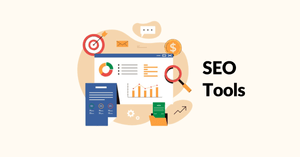What are SEO Audit Tools?
SEO audit tools help businesses to audit and analyze the various aspects of a website to improve website rankings on various search engines. The software helps in auditing the website performance data to improve its ranking, content, interface, loading speed, etc. The SEO tools can help companies with link building, keyword research, backlink monitoring, and more. Additionally, it can also help them in identifying areas of improvement on their website and help implement effective SEO strategies to rank higher.
Businesses can use SEO audit tools to compare their content with their competitors, finding duplicate content, broken links, evaluate URL structure, find server errors, etc. Furthermore, it also provides you with all the information about all the pages indexed by Google recently.
Why Use SEO Optimization Tools?
SEO tools can help businesses in multiple ways such as:
- Optimize the website and help it rank better on popular search engines
- Choose the right keywords for content optimization
- Stay updated on the changes in search engine algorithms
- Generate reports on site rankings and performance on various search engines
- Perform competitor analysis and learn about their keywords and backlinking strategies
Who Uses SEO Software?
SEO software can be used by the following group of people of the organization:
- Content Marketers: Content marketers use this software to optimize the website content. With it, they can check keyword density, place keywords logically, and check readability score. This helps to optimize content to improve the search rankings.
- Content Writers: Content writers use this software to create engaging content, check keywords density, edit content, get content ideas, etc.
- SEO Specialists: Using the software, SEO specialists can do website auditing, rank tracking, keyword analysis, etc. They can also use it to build backlinks to improve website ranking.
- Social Media Marketers: They use SEO tools to analyze social media campaigns, track users' engagement, rank videos, get suggested hashtags, and more.
Types of SEO Software
There are different types of SEO tools available for users such as:
- Keyword Tool: This tool helps you to find the most relevant keywords specific to your business. Keyword analysis tool helps you in getting info about the keyword difficulty, search volume, traffic potential etc. It helps you understand the keyword trends and ensure that only relevant keywords that can be used.
- Rank Tracking Tool: This tools lets you track the position of your website on various search engines through various keywords. With Keyword rank checker, you can track multiple keyword rankings at a time.
- Website Audit Tool: With website analysis tool, you can easily check broken links, loading time, content accuracy, keyword relevancy, design, etc. It evaluates all the components that might affect your website performance in search engines.
- Content SEO Tool: It helps you in optimizing your content to rank higher in search engines. Content SEO software identifies grammatical errors, plagiarism, and keywords related issues with your content. It helps your content reach the right audiences.
- Technical SEO Tool: This tool helps you in improving technical aspects of your website such as speed, browsing capability, sitemap, hosting, etc.
- AMP Testing Tool: Accelerated Mobile Pages (AMP) testing tools help you in making your website more mobile friendly. You can use it to improve the loading time of webpages on mobile devices.
- Competitor Analysis Tool: Using the SEO Competitive Analysis tool, you can see keyword gaps, content opportunities, and backlinks of your competitors.
SEO Software Features
Here are some of the common features users can find in every SEO software:
- Backlink Analysis: You can use it to create and analyze the backlinks to the website. It helps you to perform backlink audit of your site, finding pages bringing inbound links, finding relevant competitor backlinks, etc.
- On-Page Analysis: Perform on-page analysis to optimize the site pages with specific keywords to organically rank higher in search engines.
- Site Audits: Evaluate your site effectiveness by crawling all your web pages and finding the potential issues with it. These issues might include broke internal links, poor site speed, content quality, graphics, and more.
- Keyword Analysis: SEO analysts can analyze different keywords and choose the most suitable keywords to increase site traffic and reach target audience. You can select both short and long tail keywords for your website to increase content relevancy.
- SERP Rank Tracking: SEO software lets you track organic rank of all the keywords you want to target for any URL. It also provides you with history reports of search engines, helps you check difficulty scores, find relevant keywords, and more.
- Brand Alerts: Easily get alerts and reports whenever your brand or URL has been used or linked to any other domain. This will help in learning about your brand visibility and how your audience is engaging with your brand.
- Competitors Comparison: It helps you to analyze your website as compared to your competitors in terms of backlinks, site speed, content, etc. This data can be used to improve site rankings and content optimization.
- Content Optimization: You can optimize content by working on meta tags, keywords, readability score, adding important internal links, improving keyword density, and more.
- Rank Tracking: Most SEO tools offer rank tracking capabilities that help you to track your URL ranking on various search engines. This will help in knowing where you are ranking and what strategies you can work upon to improve your rankings.
What are the Benefits of Using SEO Audit Tool?
There are plenty of advantages of using SEO audit tools such as:
- You can easily find technical errors on your website
- You can find relevant keywords to your website and are also used by your competitors
- Measure the ranking of your website on various search engines
- You can also audit the social media handles to measure their reach and performance.
- It helps you to find poorly performing pages and the ones the need optimization.
- You can use it to find the loading speed of your website pages.
Factors to Consider Before Buying Any SEO Audit Software
Keep these factors in mind to choose the right SEO audit software for your business:
- Data Accuracy: The SEO tool you want to purchase should provide you with accurate data of your SEO strategies to gain valuable insights.
- Competition Analysis: Choosing software with competitive analysis would help you to create a strategy to outperform your rivals and rank higher.
- Auditing: SEO tool must come with an auditing feature to review site performance, loading speed, server errors, content issues, etc.
- Features: Choose software that offers features like Crawler, keyword research, backlinking tool, etc., to improve site rankings.
- Free Trial: The availability of a free trial will help you to decide whether it is right fit for you or not.
- Reports: Software should generate multiple reports related to various metrics such as ranking, site auditing, website performance, etc. This data can be used to analyze SEO campaigns.
- Cost: Invest in SEO tools whose price comes under the estimated budget.
Top 5 SEO Tools for Digital Marketing
| Software | Best For | Features |
| SemRush | Best for SEO, content Marketing, Social Media Marketing, etc. | PPC/ Market Research/ Content Marketing |
| Google Search Console | Best for Measuring site traffic and performance | URL Inspection tool/ Content Optimization/ Website Crawling |
| Moz Pro | Best for Improving website traffic and ranking | Keyword Planner/ Rank Tracker/ Site Auditing |
| Ubersuggest | Best for keyword tracking and analyzing | Domain Overview/ Keyword Suggestions/ Content Ideas |
| SpyFu | Best for competitor and rank analysis | Keyword Rank Tracker/ PPC Ad Rank Tracker/ Backlinks Creator |






















